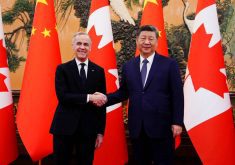Once the United States has imposed tariffs on its major trading partners it could engage in bilateral talks with countries on new trade arrangements, Secretary of State Marco Rubio said on Sunday.
Why it matters: Canadian farmers have been caught in a trade war crossfire in recent months
U.S. President Donald Trump threatened on Thursday to slap a 200 per cent tariff on wine, cognac and other alcohol imports from Europe, opening a new front in a global trade war that has roiled financial markets and raised recession fears.
Read Also

Big oat crop in 2025/26 pointing to less acres next year
Oat acres in Canada are likely to recede this spring with cash prices to remain low, said Scott Shiels, grain procurement manager for Grain Millers Canada in Yorkton, Sask.
Rubio said the United States would retaliate against nations that had imposed tariffs on it.
“This is global. It’s not against Canada, it’s not against Mexico, it’s not against the EU, it’s everybody,” he told the CBS show “Face the Nation.”
“And then, from that new baseline of fairness and reciprocity, we will engage – potentially – in bilateral negotiations with countries around the world on new trade arrangements that make sense for both sides,” he continued.
Rubio, who did not give details of what the new deals could look like, said the United States would “reset the baseline” to ensure it was treated fairly.
“We don’t like the status quo. We are going to set a new status quo, and then we can negotiate something, if they (other nations) want to,” he said. “What we have now cannot continue.”
— Reporting by David Ljunggren















